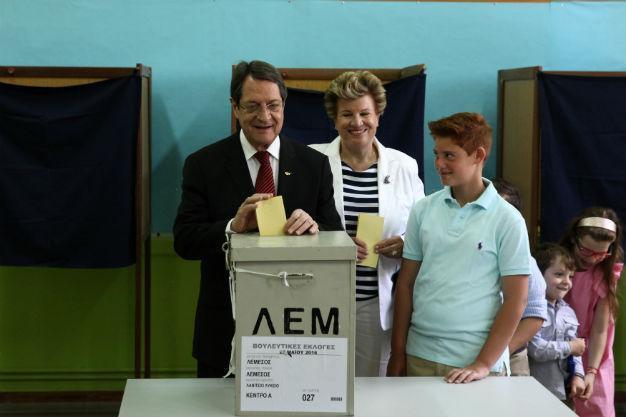Greek Cyprus parliament shakeup after record low voter turnout
NICOSIA - Agence France-Presse

REUTERS photo
A record low turnout in Greek Cyprus elections on May 22 resulted in the biggest shakeup in the island's parliamentary history following a three-year economic downturn and amid disillusion with the political establishment.
The ruling rightwing DISY party won with 30 percent of the vote, but the polls also resulted in the most fractious assembly ever with the far-right National Popular Front (ELAM) entering parliament.
The main opposition party, the communist AKEL, garnered 25 percent, a drop in support of seven percent.
After what was seen as a protest vote against the two established parties and with the low turnout playing into the hands of smaller parties, an unprecedented eight parties will make up the new parliament.
Election officials gave a turnout of 67 percent, with an abstention rate of one third, a record for Greek Cypriot parliamentary polls in which voting is in theory compulsory.
President Nicos Anastasiades, whose rightwing government negotiated a 2013 eurozone bailout and has claimed credit for the island's subsequent recovery, had urged voters not to abstain.
"I believe that the decision of much of the electorate abstaining from the elections should trouble everyone," he said.
His party leader Averof Neophytou was more upbeat.
"We are the only governing party in Europe that introduced the toughest bailout programme and we are still the first party," he said, while acknowledging that politicians needed "to win back the trust of the voters".
Opposition leader Andros Kyprianou said: "Akel voters have not gone to other parties, they just didn't show up."
A spate of corruption scandals in public office and parliament's handling of the eurozone bailout agreement have sparked widespread anger and disenchantment with the political scene.
ELAM's entry into the 56-member Greek Cypriot parliament, having won 3.7 percent of the 360,000 votes cast, a result which is expected to give it two seats, echoes the wave of rightwing populism that has swept through Europe.
ELAM defends the Athens-inspired coup of 1974 that sought to unite the island with Greece and that triggered Turkey's partial intervention of northern Cyprus.
Progress on UN-backed talks to reunify the island was not an election issue because both the main parties support reunification of the divided island under a federal roof.
But the weakened position in parliament of AKEL, a vocal supporter of the talks, could spell trouble for the process.
The negotiations are at a crucial stage and Greek Cypriot leader Anastasiades and his Turkish Cypriot counterpart Mustafa Akıncı must make painful compromises to reach a deal.
Greek Cyprus has emerged from three years of economic slowdown after the government imposed harsh austerity measures in exchange for European Union and International Monetary Fund bailout.
In return for 10 billion euros ($13 billion at the time), Greek Cyprus agreed in March 2013 to wind down its second-largest bank, Laiki, and impose losses on depositors in undercapitalised top lender Bank of Cyprus.
In March this year, the euro group of finance ministers praised Nicosia for its successful exit from the bailout programme.
And the Greek Cyprus economy is expected to grow by 2.2 percent in 2016.
A total of 542,915 people were eligible to vote on Sunday, with a record 493 hopefuls standing for parliament.
